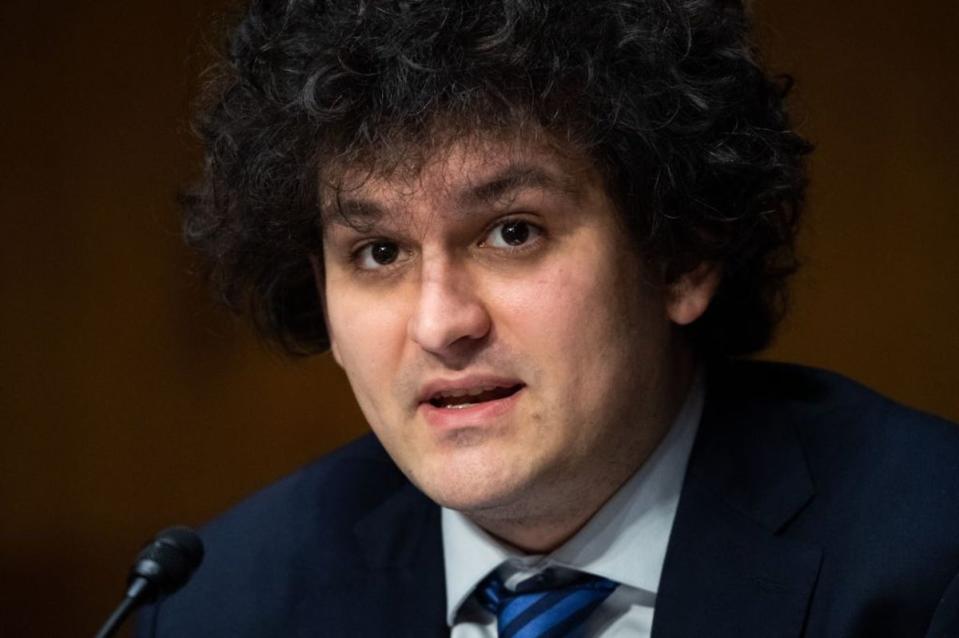‘It all fell apart’: How a ‘crypto saviour’ lost $16bn in just one day

In December, Sam Bankman-Fried testified before Congress about why cryptocurrencies could never go the way of the large investment banks that capitulated in the global financial crisis of 2008.
“No one knew how much risk was in that system until it all fell apart,” the 30-year-old founder and CEO of cryptocurrency exchange firm FTX said.
“If you compare that to what happens on FTX or other major cryptocurrency venues today, there is complete transparency about… the positions that are held. There is a robust consistent risk framework applied.”
This week, Bankman-Fried had his own Lehman Brothers moment in a head-spinning turn of events that has shaken investor confidence in crypto, perhaps permanently.
Investors began fleeing the Bahama-based FTX after a larger rival crypto exchange firm, Binance, raised concerns over the weekend about its financial stability.
An estimated $6bn was drained from FTX’s books in three days.
The fears were amplified by Binance’s CEO Changpeng Zhao in what Forbes claimed may have been an attempt to detract from problems at his firm.
Binance then pledged to buy out the rival to stave off collapse, only to abruptly pull out of the deal on Wednesday. Binance accused FTX of mishandling customer funds and cited issues with corporate governance, wiping out 80 per cent of the value of FTX’s in-house crypto token.
The collapse sparked panic among crypto investors, and saw the value of Bitcoin and Ether plunge by more around 20 per cent in one day.

Almost overnight, Bankman-Fried’s net worth plummeted from $16bn to under $980m, according to a Bloomberg wealth index.
Sequoia Capital, one of the fund’s largest investors, said in a letter on Wednesday it considered the $213m it held in FTX to be essentially worthless.
Other investors who had placed a significant bet on FTX — including Canada’s third largest pension fund, The Ontario Teachers’ Pension Plan — have also seen huge losses.
FTX is now reportedly under investigation by US authorities about how it handled customers’ deposits, according to the Associated Press and other media outlets.
Bankman-Fried, who was hailed as a crypto saviour earlier this year when he helped shore up a number of companies that ran into financial trouble, issued an apology on Thursday.
“I‘m sorry. That’s the biggest thing. I f***ed up, and should have done better,” he wrote on Twitter on Thursday.
On Friday, FTX Trading and Alameda were placed into bankruptcy in the Delaware courts and Bankman-Fried resigned as CEO.
2022 has seen the demise of several crypto exchanges, including Celsius and Voyager, and tokens Luna and terraUSD, while the value of more established tokens like Bitcoin and Ether has fallen along with other asset classes.
However, FTX was seen as one of the more stable currencies, and its deep-pocketed founder was feted by celebrities and politicians.
Bankman-Fried donated more than $5m to Democrats during the 2022 midterms, while FTX bought naming rights to the Miami Heat’s basketball stadium.
Who is Sam Bankman-Fried?
Bankman-Fried was born and raised in the Bay Area in California, where both of his parents are law professors at Stanford Law School.
He graduated MIT with a physics degree before taking a job at Jane Street Capital, and as an adherent to “effective altruism”, began donating half of his income to charity.
He first rose to prominence after founding cryptocurrency trading firm Alameda Research in 2017 at the age of 25.
Bankman-Fried worked out how to exploit an unusual quirk in crypto values — that the price of Bitcoin was about 10 per cent higher in Japan than in the US.
He worked out a way of buying Bitcoin in the US and selling it in Japan, at a time when digital assets were still eyed suspiciously as funding illegality on the dark web.
Alameda quickly became a major player in crypto, and boasted of having more than $90m in digital assets while trading between $300m to $1bn daily.
Initially based in Berkeley, California, Bankman-Fried relocated to Hong Kong in 2018 after realising the looser regulatory environment would benefit profits.
He founded FTX in 2019 and relocated to the Bahamas in 2021.
Perennially dressed in shorts and sneakers, with unkempt locks and an awkward demeanour, Bankman-Fried befriended prime ministers, presidents and popstars.
In April, Bankman-Fried hosted the Crypto Bahamas conference where he led an onstage panel featuring Bill Clinton and Tony Blair, a New York Times profile noted.
“Everywhere he went, crypto entrepreneurs offered handshakes and fist bumps, patting him on the back as they pitched projects or presented him with branded swag,” the Times wrote.
Despite having a net worth of $21.2bn, he continued to lead a frugal lifestyle, donating heavily to philanthropic causes, and pledged to donate his entire fortune to charity.

“Sam Bankman-Fried drives a Corolla, sleeps on a beanbag, and has a Robin Hood-like philosophy,” a Bloomberg article described.
In February, FTX purchased a Super Bowl advertisement starring Larry David.
Attending the NFL’s marquee event in Los Angeles, Bankman-Fried befriended Tom Brady, Katy Perry and Orlando Bloom, the Times reported.
The decision to base himself in the Bahamas was at least in part driven by the island nation’s light regulatory touch.
According to the Times, 80 per cent of its billion dollar pre-meltdown revenue derived from a particularly risky form of investment where investors borrow money to bet on future increases in the value of crypto.
This form of investing — which can lead to enormous profits or losses — remains illegal in the US.
Bankman-Fried emerged as one of the most high-profile crypto champions in Washington DC and used his profile to lobby Congress to relax rules around crypto trading.
On Thursday, the founder had been trying to put together a $9.4bn rescue package to save FTX, according to a Reuters report.
Then on Friday morning, FTX Trading, Alameda Research filed for bankruptcy in the Delaware courts and Bankman-Fried resigned as CEO.
What now for crypto?
According to a recent report from crypto news site Coindesk, the two parts of Bankman-Fried’s crypto empire, Alameda and FTX, had become “unusually close”.
Coindesk obtained a leaked balance sheet showing that Alameda’s value was built on a “foundation largely made up of a coin that a sister company invented”.
The Department of Justice and Securities and Exchange Commission are now examining the relationship between both businesses for any possible wrongdoing, according to the Associated Press.
Investigators are focusing on whether FTX may have used investors’ deposits to fund bets at Alameda Research.
In traditional markets, brokers are expected to separate client funds from other company assets, the AP notes.
FTX US, its US-based business business, comprises only a small part of the larger FTX empire and is subject to regulation by lawmakers in Washington.
On Thursday, FTX US‘s website was down, and the company said it had halted trading “for a few days”.
Addressing the controversy on Thursday, White House press secretary Karine Jean-Pierre said that they were closely monitoring developments.
“The administration has consistently maintained that, without proper oversight of cryptocurrencies, they risk harming everyday Americans,” Ms Jean-Pierre told reporters.
The price of Bitcoin, which is down 75 per cent from its all time high last November, rallied on lower inflation data on Thursday.
But the impact on the broader market is likely to be felt for some time, and some analysts predict it could lead to an exodus of large financial institutions that have embraced crypto.
“From a financial side, it’s fair to say that confidence is going to be somewhat shaken because if you can’t trust FTX then what can you trust?” Yat Siu, co-founder of Hong Kong-based Animoca Brands, told Reuters.

 Yahoo Finance
Yahoo Finance 